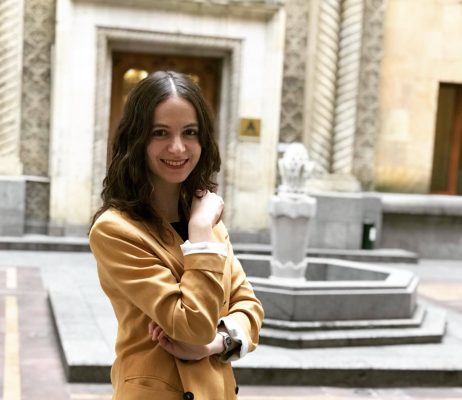
Mariam Tsitskishvili
Eastern European and Russian Studies alumni, Invited Specialist at the Georgian Parliament
Mariam, your background was always related to political science, you have a Bachelor’s degree in International Relations and you did your Master’s here at IIRPS VU. Where does your interest in politics come from?
In 2009, I became a finalist of high school exchange program and got to spend one academic year in the USA and that is when I first got interested in politics and international relations. Opportunity to live and study in the US shaped my future, career-related plans for me. I had two wonderful classes at the American high school that mostly contributed to the process of turning international relations and politics into my sphere of interest: US Government and US History.
Shortly after coming back to Georgia, I got involved in various youth projects that took me to several foreign countries including Belgium (Brussels) where I visited places like the European Parliament, the NATO HQ – met with some of Europe’s high officials and that is when I knew exactly what I wanted to study next.
Why did you decide to continue your studies here in Lithuania? Can you tell us more about your experience in Vilnius?
My studies were completely related to my interests – I wanted to learn and get academic insights into Russia’s foreign policy and the region of Eastern Europe since my home country is part of this region and Russia’s foreign policy directly affects us on a daily basis. I did some research on universities with similar graduate programs and really liked what the Institute of International Relations and Political Science of Vilnius University had to offer.
As for my experience in Vilnius – it was fantastic, I can talk about it for hours but for now, I will say a brief word or two. I learned a lot, met many people. The faculty and studies played big role in all these. I am forever thankful for the Eastern European and Russian Studies programme – academic staff and students for making the studies interesting and quite challenging.
I should say that I am forever thankful to the Vilnius University for building the MKIC library and offering the students 24/7 service without which it would be so much harder to obtain a degree. I think I spent more time there than anywhere, including my dorm room, throughout my time in Vilnius (1.5 years).
It should be also noted that the weather was quite a challenge for me, as I naturally prefer the sun and warmth. I was struggling and whining but it was not helping, so I forced myself to get used to it and survived.
You came here from Georgia, your country is still going through a lot of political changes and reforms, can you evaluate recent situation in Georgia?
True, Georgia has been going through political changes and reforms for years; it is not something new for us. I would say that, despite all the challenges that the country faces internally or externally, we are on the right track – towards the Euro-Atlantic integration.
Mariam, you had been working in the National Democratic Institute and now you are continuing your work in the Parliament of Georgia. Can you tell us more about your working experience and your future plans?
In 2018, one month after coming back to Georgia, I started working as the Parliamentary Program Fellow of the National Democratic Institute. It was one year fellowship and I was based at the Parliament. The year was full of experiences as I had a chance to observe the world of real politics, to learn and get hands-on experience of how the highest legislative authority of the country works. What is more important, I grew professionally and personally.
It has been two weeks since I finished the fellowship and continued working at the Parliament. Considering the fact that I have not lost time since obtaining the MA in Vilnius, it makes me think that my studies have been successful so far.
The application process already started for next year. What should the new students expect from their studies in Vilnius?
Development of critical thinking, challenging debates and tasks, improvement of research skills and academic writing, time-management, professional and very helpful academic staff. Furthermore, practical experience – chance of travelling and exploring the region along with studying and honestly, no regrets.
Mariam, can you give some advices for our students how to start their own career and how to never give up?
For me, the key of not giving up is to work hard, stay positive and realize that all of us have ups and downs in our lives and tough times should not restrain us from moving forward.







